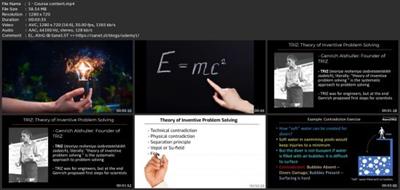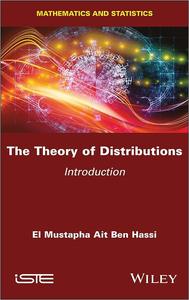
Theory Of Inventive Problem Solving (Triz) For Scientists
Posted on 12 Dec 12:31 | by mitsumi | 26 views

Published 12/2022
MP4 | Video: h264, 1280x720 | Audio: AAC, 44.1 KHz
Language: English | Size: 236.03 MB | Duration: 0h 30m
Methods and approaches of inventors, engineers and scientists
MP4 | Video: h264, 1280x720 | Audio: AAC, 44.1 KHz
Language: English | Size: 236.03 MB | Duration: 0h 30m
Methods and approaches of inventors, engineers and scientists
What you'll learn
Historical methods of inventions
Edison: trial and error method
Morphological analysis
Tesla: good imagination and inspiration
Classical TRIZ theory with examples
TRIZ: ideal final result
TRIZ: administrative, technical, physical contradictions
TRIZ: separation principles
TRIZ: Vepol or Su-field, Fepol or Ferfiel
Levels of inventions
Standard solutions
Laws of technical systems evolution
Algorithm of inventive problems solving (ARIZ)
Talented thinking or thinking in time and scale
Database of materials, physical, chemical, biological, geometrial effects
Altshuller's prediction "Theory of Discoveries": discovery of a new phenomena and laws
Modeling physical contradictions in Algodoo simulator
Research-scientific methodology: research topic and literature search
Research-scientific methodology: hypothesis testing, design of experiments
Research-scientific methodology: analysis, entrepretation of data
Research-scientific methodology: publishing research papers
Requirements
It is desired to have expertise in one or several fields
Understanding of research and scientific methods
Description
Inventors, engineers and scientists are different categories of people with own objectives and intentions. An inventor is a person who has invented something, or whose job is to develop new products and processes. Engineers are professionals who uses scientific knowledge to design, analyze, build, improve and maintain complex structures such as automobiles, roads, railways, and bridges (engineers typically ask "what is the application?"). A scientist is a person who conducts scientific research in applied or fundamental science to advance knowledge in an area of interest (typically scientists ask "why is it interesting?").In this course I will discuss perspectives of theory of inventive problem solving for scientists. Historically, different methods and approaches have been used to make inventions. For example, Thomas Edison succeeded with a trial and error or guess and check – a fundamental heuristic method of problem solving in engineering. Nikola Tesla operated with imagination, while Genrich Altshuller, the founder of Theory of Inventive Problem Solving, developed various approaches such as interdisciplinarity, formulation of a problem from engineering situation, ideal final result, solution of contradictions using 10 thousand physical, chemical, biological, geometrical and other effects, vepol or Su-field, standard solutions, patterns of invents, laws of technical systems evolution; and algorithms of inventive problem solving (ARIZ). However, TRIZ can be used mainly to make engineering inventions, not fundamental scientific discoveries. Nonetheless, Altshuller started to work and published several pages about new theory of discoveries, which can help scientists. In this course I will overview historical methods, classical TRIZ theory, scientific research methodology and I will speculate about TRIZ advantages and drawbacks. An interdisciplinary approach to engineering and science. Modern science originated in the 19th century, science was organized using the model of university departments, divided into different disciplines (such as chemistry, physics, biology, materials science and others). It was done party by necessity to achieve high specialization and organize knowledge. However, for i) innovations and ii) solutions of complex problems these artificially created barriers among disciplines do not help. We need to find method to break down these artificial barriers not only among different disciplines, but also between basic science and application. Students and scientists should get trainings not only in research methods and writing research papers, but in more broader skills of creating inventions. For example, what do we know about interdisciplinary approach? Each scientist has a unique set of knowledge, expertise and experience that can be applied in other areas of science and technology. For example, knowledge of the process of laminar fluid movement in small channels can be used in medicine (design of biochips, navigation of microrobots in vessels), in energy (such as in micro-fuel-cells), electronics (such as liquid cooling of computer processors). Using interdisciplinary approach one can apply own unique knowledge in other areas of science or technology.
Overview
Section 1: Introduction
Lecture 1 Course content
Lecture 2 Course details
Section 2: Engineers and scientists - entrepreneurs
Lecture 3 Why engineers and scientists fail with innovations?
Lecture 4 Examples: psychological inertia
Section 3: Historical inventive methods
Lecture 5 Morphological, breainstorming, trial and error, and interdisciplinary methods
Section 4: Altshuller prediction: "Theory of Discoveries"
Lecture 6 Original thoughts on theory
Students, inventors, engineers and scientists,Anyone interested in inventive problem solving

Download link
rapidgator.net:
uploadgig.com:
[/b]:
[b]1dl.net:
Related News
System Comment
Information
 Users of Visitor are not allowed to comment this publication.
Users of Visitor are not allowed to comment this publication.
Facebook Comment
Member Area
Top News



